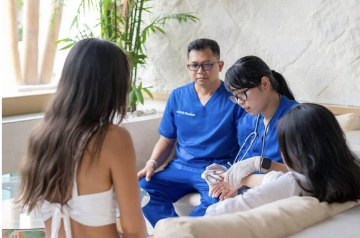
Layanan IV Hangover di Bali: Kapan Cocok dan Kapan Harus Periksa Dulu
Bangun dengan hangover parah di Bali? Matahari Januari 2026 baru saja mengintip di balik rimbunnya pepohonan di villa Anda di
As the popular Indonesian island of Bali gears up for an influx of tourists during the upcoming school holidays, Western Australian health authorities are urging travelers to be vigilant about the recent surge in dengue fever cases in the region. With the number of notifiable dengue fever cases tripling compared to the same time last year, it’s crucial for visitors to understand the risks associated with this mosquito-borne disease and take necessary precautions to protect themselves.
In this blog post, we’ll delve into the world of dengue fever, exploring how to avoid infection, the prevalence of the disease in Bali, and the diagnosis and treatment options available, including the convenient services offered by Trishnanda Care Centre.
The best defense against dengue fever is to minimize your exposure to mosquito bites when visiting Bali or other high-risk areas. Here are some practical steps you can take to protect yourself:

Dengue fever is a significant public health concern in Bali and throughout Indonesia. In recent years, the country has experienced a notable increase in dengue cases, with over 90,000 reported cases nationwide so far in 2024. Bali, being a popular tourist destination, has also seen a rise in dengue fever incidence, making it essential for travelers to be aware of the risks and take appropriate precautions.
While the majority of dengue fever cases result in mild flu-like symptoms, the disease can be severe and potentially fatal, especially for those who contract dengue fever for a second time. It’s crucial for visitors to Bali to understand the seriousness of the disease and prioritize prevention measures to safeguard their health.
If you experience symptoms such as high fever, severe headache, pain behind the eyes, muscle and joint pain, nausea, vomiting, or skin rash within 14 days of visiting Bali or another dengue-endemic area, it’s essential to seek medical attention promptly. A healthcare professional can diagnose dengue fever through a combination of physical examination and laboratory tests, which may include:
Prompt diagnosis is crucial for appropriate management and monitoring of the disease, as severe dengue can rapidly progress and lead to serious complications if left untreated.
While there is no specific treatment for dengue fever, medical care can help manage symptoms and prevent complications. Treatment typically focuses on supportive care, which may include:
Currently, there is a dengue vaccine available, known as Dengvaxia, which has been approved for use in several countries. However, the vaccine is only recommended for individuals with a documented prior dengue infection, as it may increase the risk of severe dengue in those who have never been infected before. It’s essential to consult with a healthcare professional to determine if the dengue vaccine is appropriate for your individual circumstances.

At Trishnanda Care Centre, we understand the importance of convenient and accessible healthcare services for travelers in Bali. Our experienced medical team offers a range of services to help you protect yourself against dengue fever and receive prompt treatment if needed.
As dengue fever cases continue to rise in Bali, it’s crucial for travelers to prioritize prevention and be aware of the risks associated with this mosquito-borne disease. By taking proactive measures to avoid mosquito bites, understanding the prevalence of dengue fever in the region, and knowing the signs and symptoms to watch out for, you can significantly reduce your risk of infection.
If you do suspect you may have contracted dengue fever, seeking prompt medical attention is essential. Trishnanda Care Centre is here to support you throughout your journey, offering convenient and personalized dengue prevention and treatment services, including the dengue vaccine, diagnostic testing, and supportive care.
Remember, your health and well-being should always be a top priority, especially when traveling to dengue-endemic areas like Bali. By staying informed, taking precautions, and having a trusted healthcare partner like Trishnanda Care Centre by your side, you can enjoy your Bali adventure with peace of mind.
Common symptoms of dengue fever include high fever, severe headache, pain behind the eyes, muscle and joint pain, nausea, vomiting, and skin rash. These symptoms typically appear 3-14 days after the infected mosquito bite and can last for 2-7 days.
Dengue fever is transmitted through the bite of an infected Aedes mosquito. These mosquitoes are primarily active during the day, especially in the early morning and late afternoon. They breed in stagnant water, often found in urban and semi-urban areas.
While most dengue fever cases result in mild illness, the disease can be severe and potentially fatal, particularly for those who contract dengue fever for a second time. Severe dengue, also known as dengue hemorrhagic fever, can cause plasma leakage, severe bleeding, organ damage, and shock, which can lead to death if not promptly treated.
There is no specific cure for dengue fever. Treatment primarily focuses on supportive care, which includes rest, hydration, and managing symptoms such as fever and pain. In severe cases, close medical monitoring and intervention may be necessary to prevent and treat complications.
To protect yourself from dengue fever while in Bali, take the following precautions:

Bangun dengan hangover parah di Bali? Matahari Januari 2026 baru saja mengintip di balik rimbunnya pepohonan di villa Anda di

Kapan waktu terbaik untuk melakukan tes NS1? Tes NS1 (Dengue Early Antigen) paling akurat dilakukan dalam 1 hingga 3 hari
Contact Our Doctor Now